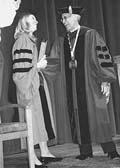Convocation focuses on future
Chancellor honors professors, revelas goals
for new year
By Tyson Trice
staff reporter
Putting 10 goals into action during this 128th academic year will help
move the university to the next level of academic distinction, Chancellor
Michael Ferrari said Tuesday during Fall Convocation.
At the ceremony, Ferrari also awarded the Wassenich Award for Mentoring to biology professor Phil Hartman and the Chancellor’s Award for Distinguished Teaching to Rhonda Hatcher, an associate professor of mathematics.
 Ferrari
said the university has met many goals within the past year but still
has much to improve.
Ferrari
said the university has met many goals within the past year but still
has much to improve.
“We are viewed by many throughout Texas, the nation and abroad as
a university on the move,” Ferrari said to a packed Ed Landreth Hall
Auditorium. “Achievements during the last 12 months alone give rightful
credence to such praise.”
Record enrollments, new academic programs and increased diversity were among the accomplishments mentioned by Ferrari.
“Much hard work lies ahead in sharpening the long-term strategic vision for TCU, but I would like to suggest this morning that we dedicate ourselves to a robust agenda this year that demonstrates our resolve to become the best university we can become,” he said.
The first goal Ferrari said he will work to implement is the integration of academic and co-curricular programs.
Studying and replacing University Curriculum Requirements with a new curriculum that is consistent with the university’s mission and values was the next goal outlined by Ferrari.
“I will be asking the provost and the chairman of the Faculty Senate to appoint a blue-ribbon commission to design such a curriculum that can be ready for submission and consideration by appropriate governance groups by the end of this academic year,” Ferrari said.
Other points included a focus on the student body, diversity and technology:
- Increasing the academic profile and diversity of the undergraduate student
body
- Creating a greater presence of and support for graduate education
- Developing new incentives that can break down department and college/school
barriers that inhibit interdisciplinary teaching and research or exciting
curricular renewal
- Studying the needs and priorities in technology
- Establishing TCU as a leading global university
- Crafting a long-term plan for the ongoing and systematic upgrading of
classrooms, laboratories and studios
- Expanding TCU’s partnership with the Fort Worth community and deploying
human, physical, artistic and intellectual capital in ways that amplify
the city’s plans for future development
- Taking actions to enhance the quality and reputation of academic programs
and give additional support to those programs that are likely to receive
national and international distinction
“It is my hope and expectation that increased support and visibility for these programs will bring not only greater recognition to them, but also to all academic programs at TCU,” Ferrari said.
Spanish and Latin American studies professor Mary McKinney said she is excited about the path TCU is taking.
“I think (Ferrari) is very ambitious,” McKinney said. “There’s a new vitality among the faculty and students. He’s bringing an enthusiasm to the university that will place us in a good position globally. I think TCU will be attractive to students outside the state and country that might not have known about us in the past. Now we are more visible.”
When presented his award, Hartman walked onto the stage to a standing ovation. Hartman was praised by students for giving one-on-one counseling for the premed program. Also known for his activities outside the classroom, one student nomination described him picking weeds and planting corn in Santa Fe this summer at Frog Camp.
“He’s a wonderful guy who made me excited about my freshman year,” said Molly Scott, a freshman graphic design major.
Hatcher said she has been nominated numerous times but didn’t expect to receive the award.
“I really didn’t think this was my year,” said Hatcher, who received $20,000 as part of the award. Students described her in their nominations as a coach, cheerleader and mentor.
Tyson Trice
r.t.trice@student.tcu.edu
Some schools nix SAT requirement
TCU still requires test for admission
By Emily Ward
staff reporter
Although almost 300 colleges have decided to eliminate SAT requirements
in their freshman admissions, future TCU applicants will still have to
submit their scores if they want to be considered.
Dickinson College in Carlisle, Pa., was one of about 85 colleges in the early 1990s who took the “bold” step of eliminating the SAT requirement for admission, said Robert Massa, vice president for enrollment, student life and college relations at Dickinson College.
“It really was environmental more than anything else,” Massa said. “Dickinson had experienced a drop in the number of applications and (also) measured the academic quality of students, which is not only measured by SAT scores, but by high school grades as well.”
To the advantage of Dickinson College, the gamble paid off because it
sent a loud signal to counselors and students that colleges are more interested
in the whole student, not just his or her test scores, Massa said.
But the question is, why have other colleges like TCU not jumped on the
optional SAT bandwagon?
Leaving out the SAT requirement would provide less information about each applicant, said Jim Atwood, assistant to the dean of admissions at TCU. Although it is only one factor in the admission process, SAT scores can still provide an objective comparison between individual students, he said.
But TCU does not look at the SAT scores as first priority, Atwood said. Scores are usually third or fourth down the priority list, under high school academic success and the personal essay, he said. Other attributes such as motivation, time management skills, desire and personal attitude are not reflected in a single test score, he said.
Kate McDougall, a junior interior scene design major, said schools should look at the overall student by seeing what advanced classes they took in high school, how much they have contributed to the community and what kind of roles they have as leaders in different organizations.
“I think colleges in general need to re-evaluate their system of admitting students,” she said. “I am aware that there has to be a cut-off factor, but they should make it a more broad selection than just looking at test scores.”
This is not saying the SAT is a bad indicator of a student’s ability
to be successful, Massa said. The problem lies where colleges use the
scores as a short-hand method for cutting applicants, he said.
“Just as parents and students are looking at U.S News and World Report
(for prospective colleges), so are colleges looking at students’
SAT scores,” Massa said. “And that is an abuse of the SAT.”
Since Dickinson College made the SAT an optional section on applications, entering freshmen classes have gained an average of about 60 SAT points, Massa said. And even though it is not required, 91 percent of Dickinson applicants still submit their SAT scores to the college, he said.
And if other colleges would make the SAT section optional, they would probably see that the majority of students will give out their scores willingly, Dickinson said.
“The point is, I do not want to do away with the SAT because it can be a good indicator,” Massa said. “Let’s just not make those scores first priority.”
Emily E. Ward
e.e.ward@student.tcu.edu
House secretary resigns
Cordova appointed for remainder of semester
By Kristina Iodice
staff reporter
Jason Cordova, a senior advertising/public relations and history double
major, was inducted Tuesday as the Student Government Association Secretary
for the duration of the fall semester after Ben Rebstock resigned last
week.
“(Jason) is available a lot to me, he is willing to go out and
do all these things,” said Ben Jenkins, SGA  President.
“It’s what we wanted for the position and Ben wouldn’t
be able to offer that anymore.”
President.
“It’s what we wanted for the position and Ben wouldn’t
be able to offer that anymore.”
Rebstock, who did not return repeated phone calls concerning his resignation, was elected last spring during officer elections for the House of Student Representatives.
Jenkins said Rebstock’s resignation was made after discussion between Rebstock and House officers. He said Rebstock had been offered a chance to produce a radio show.
“I told him that he probably should go ahead and step down,” Jenkins said. “He would have stuck it out if we really insisted, but everyone involved thought to do that would have cost him too much and would have cost us a lot too.”
Sara Donaldson, vice president of the House, said if the secretary had resigned in the spring, there would have been another election for the position.
According to the SGA Constitution, if an executive officer is unable
to serve his or her term, the SGA Administrative Cabinet will select a
replacement until one is elected. If the vacancy occurs in those offices
during the second semester of the cabinet’s term, the appointed replacement
will finish the term.
Jenkins said he recommended Cordova to the Administrative Cabinet after
Rebstock informed the House of his possible resignation.
Cordova has been involved in House for two years.
One of the major duties of the secretary is to keep the office running,
Cordova said. It requires everything from ordering supplies to typing
minutes. A big responsibility is being an assistant to the president,
he said.
“The secretary’s role is more of a helper position; it really
requires working as part of the team and I certainly hope to do that,”
Cordova said. “My goal is to stay busy and keep the student government
running all right.”
Donaldson said there might be a referendum to change part
of the constitution because procedure on dealing with a resignation is
not entirely clear.An amendment would have to be voted on by the student
body.
“Ben’s decision enabled us to see some areas we had not anticipated
as being weak spots in our documents that needed to be fixed,” Jenkins
said. “Maybe this is something that is trivial to some students,
but maybe it means a difference in how things are run and that means a
difference in their lives.”
Kristina Iodice
k.k.iodice@student.tcu.edu
Teacher shortage grows in Texas
By Kristina Iodice
staff reporter
Chad Kingsbury wants to be a teacher because he has found no greater high than the look in a child’s eyes when they completely comprehend something.
“I tutor a high school girl once a week, and some of my greatest memories are when she and I made a breakthrough,” said Kingsbury, a senior math major. “To know that you have made her life that much more enriched is a wonderful thing.”
But many of the high schools in Texas and across the nation are having trouble finding people like Kingsbury, as the shortage of teachers continues to spread.
Dale Young, director of student teaching and career services, said some of the top high school districts had to start the year with substitute teachers because there were not enough teachers to fill the classes.
“We needed approximately 70,000 new teachers in the state, and the universities only produced about 16,000,” he said.
The teacher shortage is changing things within the teaching field, especially
in the state of Texas. Young said the salaries for beginning teachers have gone up, and the school
districts are giving incentives and stipends to recruit teachers for critical
need areas such as math, special education, bilingual education and English
as a second language.
said the salaries for beginning teachers have gone up, and the school
districts are giving incentives and stipends to recruit teachers for critical
need areas such as math, special education, bilingual education and English
as a second language.
“We had one girl who had an elementary education certificate, but she was also bilingual and ESL,” Young said. “She was able to start at $38,500 and that is (with) no experience, no master’s degree.”
The Hurst-Euless-Bedford School District is starting teachers’ salaries at $35,000, along with Fort Worth ISD and Birdville ISD, Young said. Other incentives are giving laptop computers to first-year teachers. Some schools are even giving tuition for potential teachers to continue their education.
Based on the new incentives granted to teachers, TCU’s School of Education has had a small increase in people seeking certification over the last eight years, Young said. The state is doing a pilot project on how to keep first-year teachers in the profession.
The Teach for Texas Conditional Grant Program awards loans to qualified students looking to enter the teaching profession. After completing a five-year teaching obligation, in areas needing teachers, the debt does not need to be paid back.
“They say that right now in our state 43 percent of new teachers quit in the first three years,” Young said. “What we are trying to do is make sure our TCU students feel so comfortable about teaching that they don’t have that problem. We probably have less (than) 2 percent that quit, and some of those are simply to raise a family.”
There are approximately 150 student teachers in any given year, Young said.
The School of Education also offers a 3-2 program so students can receive their certification, undergraduate and master’s degrees in five years.
“I think we can eventually catch up because the school districts and the state are going to have to put money into the program to keep more people in the business,” Young said. “That means smaller class size, more personal benefits such as better health insurance and those types of things. The school districts and the state legislature are having to deal with this.”
Kristina Iodice
k.k.iodice@student.tcu.edu
Greek 101 focuses on drugs, alcohol abuse
By Michael Davis
staff reporter
As Greek 101 concluded Sunday night, Gary Bonas, keynote speaker from
Villanova University, reminded students that wearing sweatshirts did not
make them fraternity or sorority members, but living the values of their
organizations did.
More than 700 new fraternity and sorority members packed into the Student Center Ballroom Sunday to listen to a variety of speakers stress the values of Greek institutions and talk about alcohol and risk management at TCU’s annual orientation for new fraternity and sorority members. The six-hour event covered topics as diverse as multiculturalism, eating disorders and philanthropy.
Kate McArthur, Panhellenic Council vice president of management and one of the co-organizers of the event, said it was difficult trying to decide what to focus on.
“New members are already overwhelmed with information, and we needed to pinpoint the most important things,” she said.
Tom Sullivan, director of fraternity and sorority affairs, said new Greek members will be confronted with tough decisions on alcohol and risk management during their first year and they need information to make those choices easier.
The organizers tried to incorporate various groups from on and off campus to give a more diverse presentation, he said.
Speakers from Minority Affairs, the Brite Divinity School and the Ridglea Family Guidance Center were all present at the orientation.
Heather Estey, Chi Omega freshman premajor, found the speakers informative.
“The speakers were interesting and I felt I learned a lot,”
she said.
Rick Barnes, director of special projects and student affairs, tried to impress upon new members the legal ramifications that alcohol abuse can have.
“In the end it is your own decision, but you need to realize the legal responsibilities,” he said.
According to Barnes, university administrators recognize alcohol as the number one problem on college campuses.
“If you are under 21 you cannot consume alcohol,” Barnes said.
He gave the audience an example of a fraternity in Arizona served with a $110 million lawsuit because two underage members were involved in an alcohol-related accident.
“What would you say to your parents if you were named in a $110 million lawsuit?” he asked. “Being part of a fraternity has been an unbelievable experience for me, and I want it to be the same for you.”
Angie Taylor, director of alcohol and drug education, said students often think their peer groups are representative of the entire population.
“Just because your friends are doing it doesn’t mean everyone is doing it,” she said. “People who make A’s and B’s drink less than three drinks a week. You need to decide if you are going to be the leaders or the partiers.”
She said alcohol, marijuana and ecstasy are the top three most frequently abused substances at TCU, according to surveys of TCU students by the alcohol and drug education center. Taylor also distributed cards with guidelines for low-risk drinking and the symptoms of alcohol poisoning.
Darron Turner, director of minority affairs, addressed multiculturalism
and stereotypes.
“You need to get to know people for who they are, not for what you
expect them to be,” he said.
Using the experiences of a panel of six sorority and fraternity presidents,
Bonas challenged students to understand and accept the responsibility
of Greek membership.
Michael Davis
m.s.davis@student.tcu.edu